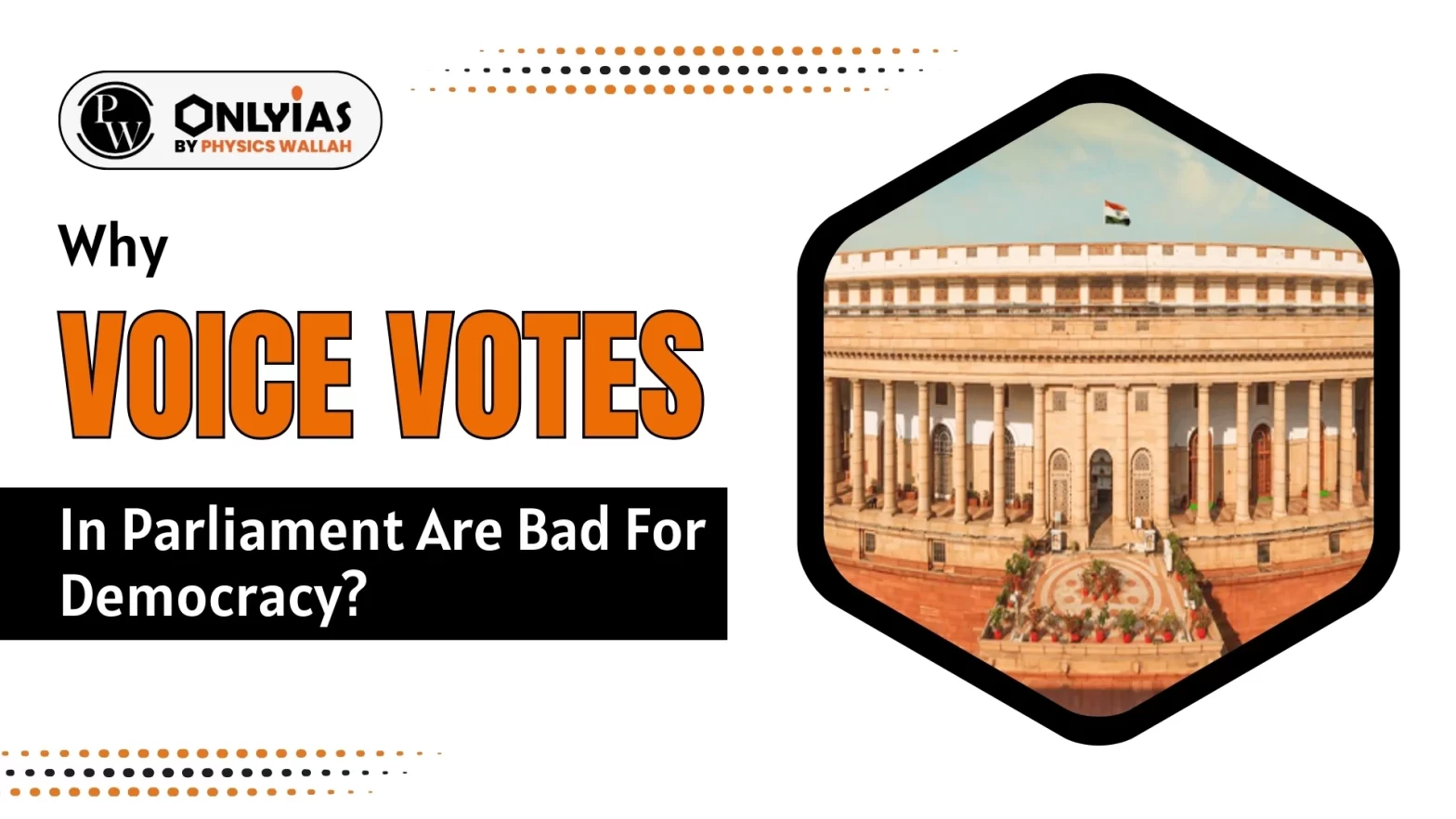Context: This editorial is based on the news “The Ayes always have it: Why voice votes in Parliament are bad for democracy” which was published in the Indian Express. Contemporary trends show a concerning pattern on voting records as a “vote of voices”.
Concerning Scenario of Passing Bills through Voice Votes in Parliament
- Suspended MPs & Passing of Bill: The recently concluded Parliament session saw the passage of 19 bills in both Lok Sabha and Rajya Sabha, where the session witnessed the suspension of 146 Members of Parliament (MPs) in both the Houses.
- Passing of the Jan Vishwas Bill, 2023: It was passed by a voice vote amid Opposition protests on the Manipur issue.
- Passing of the Farm Bills, 2020: The contentious farm bills were passed in the Rajya Sabha despite persistent Opposition protests.
Also Read: Parliament Passes Three New Criminal Law Reform Bills
Missing by Anti-Defection Law, 1985
- Aim: To curb political defections.
- Achievements: It successfully stopped floor-crossing and whipped to vote along the party lines.
- Concern: It undermined the crucial democratic principle of MP dissent.
- The quality debates are a measure of a parliamentarian’s stand on an important issue, but all deliberative discussions transform into concrete action through a vote and unfortunately, the anti-defection law has increasingly reduced this into a mere formality.
Examining the Controversial Practice of Voice Votes in Parliament
- Debate & Decision: The Constitution mandates that decisions of both Houses be made through a simple majority of those present and voting or a special majority for constitutional amendments.
- Voice Vote: After the end of the debate, the convention of orally agreeing or disagreeing, a voice vote, is used.
- It’s a preferred method for passing legislative motions, however it lacks a record of MPs present, doesn’t reflect individual stances, and can be inaccurate.
- Decision by Chairperson: The Speaker/Chairman asks MPs to call out Ayes or Noes, then decides based on the purportedly louder voices.
- The rules of procedure of both Houses state that a division shall be done if called for unless the Speaker/Chairman deems it “unnecessarily claimed”.
Desire for an Accurate Record of Vote
- In 1836, the House of Commons voted on the London and Brighton Railway Bill. It was pivotal in parliamentary history because it focused on how the vote was carried out.
- The desire for an accurate record of votes led to a precise list of the division of votes. This procedural shift was presumably to reaffirm the MPs’ electoral pledges on reform.
- Division by Counting Votes, or “Division”, from the Halls of Westminster. It is an alternate voting method where an MP can call to record the votes. The Speaker’s call for “Clearing the Lobbies” signals votes to be recorded where MPs can affirm, negate, or abstain on a motion using paper slips or Automatic Vote Recorders.
- Worldwide, voting records represent legislative processes. It further legislative transparency and accountability and focus more on crucial issues, which is important in a candidate-centric voting system.
About Division Call in India
- Use: In 2023, the Delhi Services Bill sparked a “division call” in the Rajya Sabha, where votes were counted and recorded.
- Challenge: Division calls were dismissed in Lok Sabha (2022) during the passage of the Weapons of Mass Destruction Bill and the Electricity Amendment Bill.
Need To Do Strengthen Transparency in Parliament Voting System
- Legislative Voting: It is a good alternative as it helps Opposition parties communicate their positions to the electorate by shaping the public narrative of their stance on various policies.
- Need for more Transparency: In India, the first-past-the-post system is prevalent, where electors vote for a candidate rather than the party, which requires more transparency and clarity in terms of the voting records. For without it, the “Ayes” become meaningless echoes.
Must Read: Legislative Decline In India: Challenges And Implications
![]() 6 Jan 2024
6 Jan 2024
